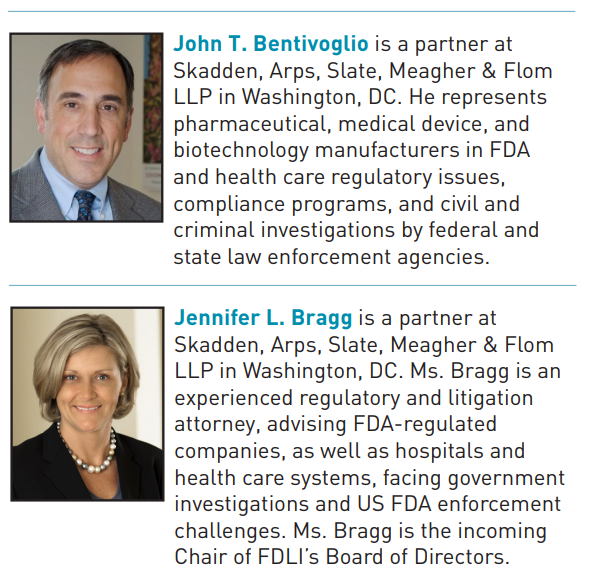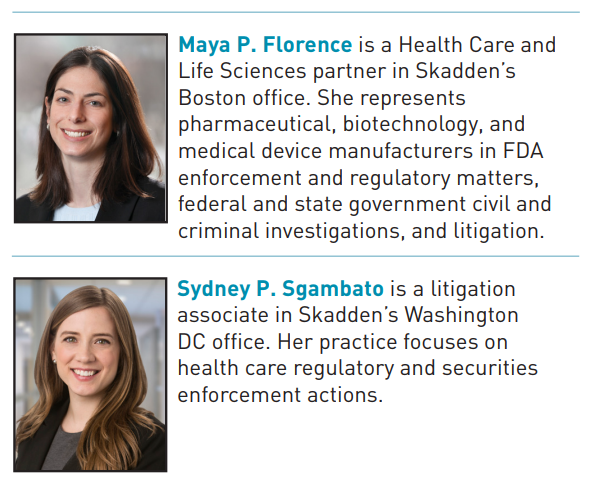
The Responsible Corporate Officer Doctrine: Protections are Needed Despite DOJ’s Cautious Approach
by John T. Bentivoglio, Jennifer L. Bragg, Maya P. Florence, and Sydney P. Sgambato 
The responsible corporate officer (RCO) doctrine—which allows for criminal prosecution and imprisonment of an individual who was not personally involved in or aware of corporate misconduct—has been the subject of heated discussion in light of Food and Drug Administration (FDA) and Department of Justice (DOJ) officials’ threats of impending RCO prosecutions. This article examines how the RCO doctrine has been applied in practice and observes that prosecutors largely have limited enforcement actions to individuals with alleged knowledge of or involvement in corporate misconduct. Nevertheless, the risk of enforcement overreach remains, and formal safeguards are needed to ensure that criminal liability—and the significant consequences that follow—are fairly and justly imposed.
Origin of the RCO Doctrine
The RCO doctrine—also known as the “Park Doctrine”—imposes strict liability upon individual corporate officers for misdemeanor violations of the Federal Food, Drug, and Cosmetic Act (FDCA).1 The doctrine’s name comes from the last case in which the Supreme Court meaningfully reviewed the doctrine, more than forty years ago. In United States v. Park,2 John R. Park, the president of a national food store chain, was convicted of a misdemeanor FDCA violation predicated on rodent contamination in the company’s warehouses.3 Park was not alleged to have had direct responsibility for sanitation but, as president, was indirectly responsible for overall operations.
for misdemeanor violations of the Federal Food, Drug, and Cosmetic Act (FDCA).1 The doctrine’s name comes from the last case in which the Supreme Court meaningfully reviewed the doctrine, more than forty years ago. In United States v. Park,2 John R. Park, the president of a national food store chain, was convicted of a misdemeanor FDCA violation predicated on rodent contamination in the company’s warehouses.3 Park was not alleged to have had direct responsibility for sanitation but, as president, was indirectly responsible for overall operations.
The Supreme Court affirmed Park’s conviction, reaffirming its prior decision—in United States v. Dotterweich4—that an individual can be held criminally liable for an FDCA violation “without consciousness of some wrongdoing” if he bears a “responsible relationship to, or [has] a responsible share in, violations.”5 It further interpreted the FDCA as imposing upon corporate officers not only the duty to seek out and remedy known violations but also to implement measures to prevent violations. The Court clarified that officers are not expected to prevent or remedy wrongdoing by doing the “objectively impossible.”6 However, the Court held that a corporate officer is criminally liable under the FDCA when he has “responsibility and authority either to prevent in the first instance, or promptly to correct, the violation complained of” and fails to do so.7
Revival of RCO Prosecutions
In the three decades following Park, cases brought under the RCO doctrine were rare; rarer still were cases that meaningfully examined the RCO doctrine in the FDCA context.8 The doctrine resurfaced in the late 2000s, however, when executives at Purdue Pharma pled guilty to FDCA misdemeanors as responsible corporate officers.9 In the Purdue case, prosecutors did not allege or offer evidence that the executives had personal knowledge of the corporate FDCA violations.10 To the contrary, charging documents explicitly noted that the executives did “not agree that they [had] personal knowledge of” the violations.11 Nevertheless, the executives paid a combined $34.5 million, and each was excluded from participation in federal health care programs. Around the same time, DOJ and FDA policymakers—perhaps responding to political criticism stemming from a number of then-record setting pharmaceutical company settlements12—repeatedly stated that prosecutors intended to use the doctrine more readily.13
In 2015, Deputy Attorney General Sally Q. Yates issued what quickly became known as the “Yates Memo,” which outlined DOJ policies intended to prioritize the pursuit of individual executives for corporate misconduct.14 The memo acknowledged that “[i]n large corporations where responsibility can be diffuse and decisions are made at various levels, it can be difficult to determine if someone possessed the knowledge and criminal intent necessary to establish their guilt beyond a reasonable doubt.”15 Nevertheless, the memo stressed that “[o]ne of the most effective ways to combat corporate misconduct is by seeking accountability from the individuals who perpetrated the wrongdoing” and dictated steps that must be taken in any DOJ corporate investigation to assess the culpability of the individuals involved.16
This announced shift in priorities generated renewed debate about the RCO doctrine’s boundaries and predictions that it would be used to convict corporate officers with no personal knowledge of the FDCA violations. However, a review of individual prosecutions of officers in FDA-regulated industries over the past ten years shows that, in practice, the government primarily has pursued corporate officers with alleged knowledge of, and sometimes even involvement in, the FDCA violations at hand.
Indeed, in a number of the cases against individuals over the past decade, corporate officers were initially charged or threatened with one or more felony FDCA violations for alleged willful, fraudulent conduct, but were convicted of only misdemeanor violations because of guilty pleas or acquittal by a jury.17 For example, four executives of Synthes, Inc. pled guilty to misdemeanor FDCA counts, in which they did not admit to any knowledge or involvement in the underlying corporate violations. Yet, the indictment and presentence investigation report in their case alleged that the executives knew the company was conducting unauthorized clinical trials using its bone cements in spinal surgeries, and that they were aware of the safety risks the trials posed to participants.18 Indeed, in sentencing one of the executives to nine months in prison, the district court emphasized that the scope of their wrongdoing was “without parallel” and “extreme.”19 Thus, this is not a case where corporate officers were convicted based on a corporate violation about which they knew nothing. Rather, the Synthes executives’ plea appears to reflect a compromise that allowed the defendants to avoid the risk of a felony conviction and allowed the government to resolve the case without “the time, expense and risk of trial.”20
In a more recent promotional misbranding case, prosecutors alleged that the CEO and VP of Sales for Acclarent, Inc., a medical device company, illegally marketed a nasal sinus device in a false and misleading manner.21 The government charged the corporate officers with multiple felony violations, including adulteration and misbranding, securities fraud, and conspiracy. Citing emails to and from the corporate officers, the government alleged that they actively led or participated in marketing and distributing the device for an unapproved use, including conducting unauthorized clinical trials, all in an attempt to boost revenue and attract potential purchasers.22 A jury acquitted the corporate officers of the felony charges but convicted them of ten misdemeanor adulteration and misbranding offenses.23 Thus, like Synthes, Acclarent is a case in which the government alleged that the corporate officers possessed knowledge and/or involvement in the underlying violation, even though they ultimately were convicted of misdemeanors.
Even in cases charged as misdemeanors, the government largely appears to have pursued individuals who allegedly contributed to an environment in which they should have known that violations were likely to occur or knew of some related underlying wrongdoing. In 2011, for instance, the government pursued misdemeanor charges against Mark Hermelin, the CEO, controlling shareholder, and former Chairman of KV Pharmaceutical in connection with KV’s manufacture and distribution of oversized (and therefore super-potent) morphine tablets.24 The government alleged that, during Hermelin’s tenure as CEO, the company had a history of misbranding and adulteration issues, including a prior misdemeanor conviction.25 It further alleged that, upon discovering that the company had manufactured super-potent tablets, Hermelin instructed his employees to minimize written communication about the problem and attempted to usurp the role of his quality control team.26 Thus, although the government did not allege that Hermelin knew the tablets were oversized at the time of distribution, it did allege that Hermelin had substantial control over the relevant manufacturing processes and demonstrated disregard for compliance.
In 2013, the government pursued misdemeanor charges against two principals of Jensen Farms based on allegations that they knew of and ignored conditions that gave rise to the company’s sale of contaminated cantaloupe that caused a Listeria outbreak and resulted in 33 deaths and 147 hospitalizations. The two officers each pled guilty to one misdemeanor FDCA violation as responsible corporate officers.27 Although the government put forth no evidence that the principals knew the cantaloupe was contaminated at the time of distribution, the principals acknowledged in their plea agreements that they each knew the company had not implemented an essential anti-contamination procedure, without which contamination could occur.28 Perhaps recognizing that the case fell on the lower end of the mens rea spectrum, the government recommended that the officers receive probation rather than imprisonment.29
Another recent food prosecution, this one brought against Quality Egg LLC and its officers, father and son Jack and Peter DeCoster (the DeCosters), resulted in significant examination of the implications of RCO prosecutions. Quality Egg and the DeCosters were charged in connection with the company’s sale of salmonella-contaminated eggs that sickened thousands of people nationwide.30 The DeCosters eventually pled guilty to misdemeanor FDCA violations, admitting only that Quality Egg had shipped thousands of adulterated eggs and that they held positions of authority within the company.31 Although the government did not allege that either of the officers were aware of the specific violations, it sought imprisonment at sentencing, pointing to evidence that each knew of the company’s sanitation deficiencies, including salmonella contamination throughout its barns and flocks, and ignored the “obvious and serious risk that the contamination would spread” to the eggs being sold.32 At sentencing, each of the DeCosters was sentenced to a three-month term of imprisonment.
The DeCosters challenged their sentences, arguing that imprisonment based only on supervisory liability violated the Due Process Clause and Eighth Amendment to the U.S. Constitution. The U.S. Court of Appeals for the Eighth Circuit affirmed the prison sentences and rejected the notion that the DeCosters were “mere unaware corporate executive[s].”33 The Eighth Circuit relied on the lower court’s findings that Quality Egg’s sanitation procedures were “egregious” and that the defendants ignored prior positive salmonella test results and knew that their employees had bribed USDA inspectors.34 The government reiterated this evidence of individual involvement when the DeCosters subsequently sought certiorari (which the Supreme Court ultimately denied), asserting that the DeCosters’ sentences “were not based on vicarious liability for others’ conduct, but rather on [their] own blameworthy acts and omissions.”35 As a result, the government said the DeCosters’ “fear that Park and Dotterweich will lead to widespread incarceration of innocent executives with no personal involvement in FDCA violations [was] unsubstantiated.”36
One notable departure from misdemeanor cases in which defendants were alleged to have knowledge of or involvement in corporate misconduct is the 2012 RCO misdemeanor conviction of Gary Osborn. Osborn was the owner, registered agent, President, sole Director, and pharmacist-in-charge of a compounding pharmacy that sold super- and sub-potent doses of a pain medication that caused three patient deaths.37 The government did not allege, and Osborn did not admit, that he knew of the medication’s potency issues nor that he contributed to or knew of safety violations in general. Rather, the government alleged only that Osborn was responsible for the pharmacy’s procedures and equipment and for making sure employees were properly trained.38 Nevertheless, unlike in Purdue, where the government recommended only probation, the Osborn prosecutors sought incarceration, citing the company’s “long history of adverse events” and “bad FDA inspections,” and asked the court to “send a message to responsible corporate officers” that the FDCA has “incredible power.”39 Ultimately, Osborn received no jail time and only a relatively small monetary penalty.40
Protections Are Needed Despite DOJ Restraint
As the cases above indicate, the consequences of RCO charges are significant. A conviction or plea to a misdemeanor count can result in incarceration, as in the Synthes, Jensen, and DeCoster cases. While Osborn may be an outlier and distinguishable given Osborn’s dominant control over a small organization, the case demonstrates that the government can and may advocate for incarceration as punishment, even absent allegations that the officer had knowledge of the underlying violation. And, as demonstrated in Purdue, the ramifications of a conviction are not limited to incarceration or probation, but also include costly collateral consequences, such as substantial monetary fines or exclusion from federal health care programs.
In first recognizing the RCO doctrine, the Supreme Court acknowledged that just the application of the RCO doctrine depended on sound prosecutorial discretion—“on conscience and circumspection in prosecuting officers.”41 While our review found that DOJ has pursued RCO prosecutions sparingly in recent years, this is of little solace to executives working in FDA-regulated industries who must rely on DOJ’s “trust us” approach to prosecutorial discretion. It also is not possible to survey the extent to which DOJ has threatened prosecution in cases that are ultimately declined or result in pleas to non-FDCA charges. The fact remains that RCO prosecutions—where an individual can be prosecuted, imprisoned, and subject to significant collateral consequences with no showing of knowledge or involvement in the misconduct—should be subject to greater procedural safeguards than currently exist. DOJ should issue written (and public) standards governing RCO actions, including adequate pre-indictment notice to the individual, an opportunity to present mitigating evidence, and procedures for internal appeal to more senior personnel within the department to ensure that prosecutors exercise their discretion in a fair, just way.
Update Magazine
December 2018/January 2019
- The FDCA prohibits the introduction or delivery for introduction into interstate commerce of any drug that is adulterated or misbranded. 21 U.S.C. § 331(a). A violation of § 331(a) is a misdemean or unless it is a repeat offense or if the person “commits such a violation with the intent to defraud or mislead,” in which case it is a felony. 21 U.S.C. § 333(a)(1) and 21 U.S.C. § 333(a)(2)
- 421 U.S. 658 (1975).
- Id. at 660.
- 320 U.S. 277 (1943).
- 421 U.S. at 672 (internal quotation marks and citations omitted).
- Id. at 673.
- Id. at 674.
- Those that did focused primarily on the “objective impossibility” defense set out in Park. See, e.g., United States v.Y. Hata & Co., 535 F.2d 508, 510 (9th Cir. 1976) (rejecting the defendant’s argument that he was entitled to an objective impossibility jury instruction because someone “maintaining far less than the requisite ‘highest standard of foresight and vigilance’ would have recognized that contamination was preventable”).
- The pleas arose in connection with allegations that Purdue had engaged in unlawful marketing of its opioid medications. See Plea Agmts., United States v. The Purdue Frederick Co. et al., No. 07-00029 (W.D. Va. May 10,2007), ECF Nos. 7-9.
- At a congressional hearing on the appropriateness of the settlement in Purdue, U.S. Attorney Brownlee testified that the evidence against the Purdue executives supported only misdemeanor charges. Evaluating the Propriety and Adequacy of the OxyContin Criminal Settlement: Senate Hearing
110-479 Before the S. Comm. on the Judiciary, 110th Cong. 10-11 (2007) (statement of John L. Brownlee, U.S. Attorney, Western District of Virginia) (“[T]he charges that we came up with were the appropriate charges under this evidence, with this evidence.”). - Agreed Stmt. of Facts at 14-15, Exh. B to Information, Purdue, No. 07-00029 (May 10, 2007); see also Information at 1-2 et seq., id.
- See, e.g., GlaxoSmithKline to Plead Guilty and Pay $3 Billion to Resolve Fraud Allegations and Failure to Report Safety Data, DOJ Press Release, https://www.justice.gov/opa/pr/ glaxosmithkline-plead-guilty-andpay-3-billion-resolve-fraud-allegationsand-failure-report (July 2, 2012). No executives were prosecuted.
- In a 2009 speech, for instance, the Head of DOJ’s Civil Division emphasized that the reach of DOJ’s healthcare fraud enforcement priorities would “not be limited to corporate actors.” Instead, DOJ’s priorities would include “criminal cases against individuals responsible for illegal conduct.” DOJ Officials Outline Enforcement Preventative Initiatives to Tackle Fraud, Health Care Daily Rep. (BNA) (Nov.16, 2009) (comments attributed to Tony West). The next year, in a letter to Senator Charles Grassley, then-FDA Commissioner Margaret Hamburg wrote that FDA intended to “increase the appropriate use of misdemeanor prosecutions, a valuable enforcement tool, to hold responsible corporate officials accountable.” Letter from Margaret A. Hamburg, M.D., FDA, to The Honorable Charles E. Grassley, Senate Cmte. on Fin. (Mar. 4, 2010). In 2011, FDA followed through and released a broad set of criteria the agency would consider when deciding whether to recommend individual prosecutions to DOJ. See Special Procedures and Considerations for Park Doctrine Prosecutions, FDA Regulatory Procedures Manual, https://www.fda.gov/iceci/compliancemanuals/ regulatoryproceduresmanual/(Aug. 2018).
- Individual Accountability for Corporate Wrongdoing, DOJ Memorandum from Sally Quillian Yates (Sept. 9, 2015), https://www.justice.gov/archives/dag/file/769036/download.
- Id. at 2.
- Id. at 1. That same year, Senators Orrin Hatch and Martin Heinreich sent a letter to then-Attorney General Loretta Lynch urging the DOJ to use the RCO doctrine to pursue corporate officers of dietary supplement manufacturers “as part of a focused-deterrence and selective targeting strategy against current and would-be transgressors.” Hatch, Heinrich Urge DOJ to Enforce Dietary Supplement Rules, Press Release (May 19, 2015), https://www.hatch.senate.gov/public/index.cfm/2015/5/joint-release-hatch-heinrich-urge-doj-to-enforce-dietary-supplement-rules.
- Discussion of RCO prosecutions often include the prosecution of Stuart and Michael Parnell (collectively, “the Parnells”) and other corporate officers of the Peanut Corporation of America for their roles in a salmonella outbreak that killed nine and sickened hundreds. However, the record shows this is not an RCO case. The Parnells were convicted at trial of multiple felonies after the government presented extensive evidence that they had fabricated certifications stating the company’s food products were safe even though testing either was never performed or had revealed contamination. See Former Peanut Company President Receives Largest Criminal Sentence in Food Safety Case, DOJ Press Release (Sept. 21, 2015), https://www.justice.gov/opa/pr/former-peanut-company-president-receives-largest-criminal-sentence-food-safety-case-two.
- See generally, e.g., United States’ Resp. to Defs.’ Objs. to Presentence Reports, United States v. Norian Corp. et al., No. 09-cr-403 (E.D. Pa. Apr. 22, 2011). The clinical trials ultimately resulted in three patient deaths. Id. at 24.
- United States v. Huggins, 09-403-3, 2011 WL 6180623, at *1 (E.D. Pa. Dec. 13, 2011).
- United States’ Resp. to Defs.’ Objs. to Presentence Reports at 4, Norian Corp., No. 09-cr-403 (Apr. 22, 2011).
- See generally Indictment, Unites States v. Facteau et al., No. 15-cr-10076 (D. Mass Apr. 8, 2015).
- Id. at 8-14. The government further alleged that the officers committed securities fraud by concealing the company’s unlawful conduct and making misrepresentations to the purchaser during the merger process. Id. at 14-16.
- See Jury Verdict, id. (July 2, 2016).
- See generally, Information, United States v. Hermelin, No. 11-00085 (E.D. Mo. Mar. 10, 2011).
- Id. at 2.
- Id. at 6.
- See generally, Information, United States v. Jensen, No. 13-1138 (D. Colo. Sept. 24, 2013).
- See Plea Agmt. at 7, id. (Oct. 22, 2013).
- Gov’t. Sentencing Stmt. at 14, id. (Jan.17, 2014) (“[T]he seriousness of the offense is tempered in this case by the lack of a willful, intentional, or knowing state of mind. These defendants were at worst negligent or reckless in their acts and omissions.”).
- United States v. DeCoster, 828 F.3d 626 (8th Cir. 2016), cert. denied, 137 S. Ct. 2160 (May 22, 2017).
- Plea Agmts, Unites States v. DeCoster, No. 14-3024 (D. Iowa June 2, 2014), ECF Nos. 16-17.
- Gov’t. Brief Opp. Defs.’ Mot. on Sentencing at 2, id. (Oct. 23, 2014).
- DeCoster, 828 F.3d at 631, 636.
- Id. at 631
- Gov’t Opp. Brief at 9, DeCoster v. United States, No. 16-877 (Apr. 12, 2017), http://www.scotusblog.com/case-files/cases/decoster-v-united-states/.
- Id. at 28.
- See generally, Information, United States v. Osborn et al., No. 12-00047 (N.D. Tex. Feb. 10, 2012).
- See id. at 4.
- See Tr. of Oct. 3, 2012 Sentencing Hr’g at 21:24-22:1, id. (Jan 10, 2013).
- See Am. J. as to Gary Osborn, id. (Nov. 27, 2012) (sentencing Osborn to five years of probation to include a brief period of home confinement and a
monetary fine of $100,000). - United States v. Dotterweich, 320 U.S. 277, 285 (1953).







